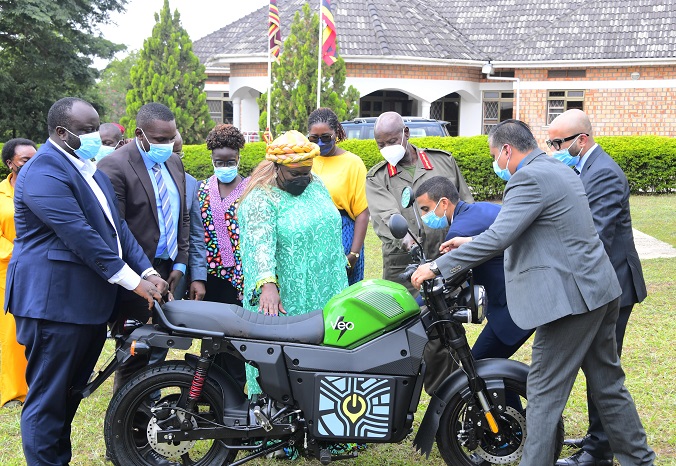
Spiro Investors meet Museveni
HABARI DAILY I Kampala, Uganda I A motorcycle manufacturing firm, Spiro has unveiled a plan to deploy over 140,000 electric two-wheelers and 3,000 charge-and-swap stations across the country by 2028.
Gaurav Anand, Spiro country head, also announced plans to partner with the Ugandan government to install about 35 battery swapping stations in Kampala by the end of the year.
“We are all set to revolutionise Uganda’s transportation landscape.
We also plan to launch electric tuk-tuks next year, further expanding our impact in Uganda,” said Anand.
This was during the commissioning of Spiro electric motorcycles during an event held at the National Leadership Institute (NALI), Kyankwanzi recently by Uganda’s President Yoweri Museveni.
The delegation from Spiro, an electric bike producing company in Africa, was led by Odrek Rwabwogo, the Chairperson of the Presidential Advisory Committee on Exports and Industrial Development (PACEID).
Formerly known as M Auto Electric, the company has been recognized for its impact on sustainable transportation on the African continent. It has so far been able to deploy over 15,000 electric bikes and facilitated more than 9 million battery swaps across countries like Benin, Togo, Kenya, Rwanda, and Uganda.
President Museveni, who praised Spiro for the new technology, said the launch was good news, since the electric bikes are better than traditional ones which require diesel.
 Spiro Invetors meet museveni
Spiro Invetors meet museveni
He emphasised Uganda’s dedication to adopting environmentally friendly alternatives.
Rosa Malango, the Chairperson of the Tumaini Africa Knowledge Centre (TAKC), informed President Museveni that 500 electric bikes are already operational in Kampala, with 150 of them sold in the first week. To make the bikes accessible for boda boda riders, she noted that a payment plan in installments has been introduced.
“The price of an electric bike is $1,000, which is significantly cheaper than the traditional diesel-powered bodas, which cost $1,480. This is about 30% cheaper,” she said.
Malango further highlighted several advantages of the electric bikes, noting that, according to their survey, riders appreciate the tubeless tires, which eliminate the need for air pumping.
“The bikes also have a battery range of approximately 80 kilometres and come with convenient charging stations across Kampala,” she said.
She hailed Ugandans for welcoming the new technology and quickly adapting to it.
Malango revealed that each bike and battery is equipped with a GPS tracker and a specific identification number, enhancing security and enabling efficient tracking in case of accidents or crimes.
“The GPS system will allow us to work with enforcement agencies to enhance security. We look forward to continued cooperation with the Ugandan government in various sectors, including the cotton industry and beef value-addition.”
The electric bikes offer affordable energy and the convenience of battery swap stations, where riders can exchange depleted batteries for charged ones.
Anand later expressed the company’s interest in establishing a textile factory in Northern Uganda, specifically in Lira District.
“This factory will focus on ginning, weaving, knitting, and spinning cotton, contributing to Uganda’s industrial development.”


